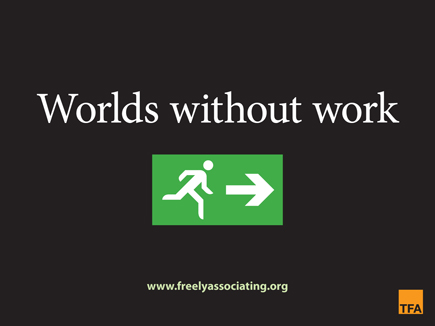
We gave a talk last night at the CommonPlace on capitalism and climate change. The slides and notes for it are available here, but a horribly brief summary goes like this…
The climate crisis is an energy crisis. It’s about the conversion of one form of energy (fossil fuels) into another. Physicists call that conversion ‘work’. But the climate crisis is also a ‘work’ crisis in the everyday sense of the word, because work is the main organising principle of capitalism. And the idea of ‘work’ as a separate, measurable activity is an incredibly recent one, dating back a few hundred years. Along with work goes separation, the way that we’re separated from each other, separated from the products of our labour, and separated from our environment (which is then tagged as ‘natural resources’). And money. But capitalism isn’t a thing out there. It’s a dynamic social relation. As we try to flee it, capital attempts to pull us back, chase us down, enclose our activities and order them through work. But capital also tries to escape us – or rather escape our insubordination. And it would like to escape its dependence upon us (ultimately of course it can’t, because the relationship is asymmetric). One of the ways it does this is by increasing the conversion of other forms of energy. So we get rising proportion of fossil-fuel (etc) energy to human energy etc etc. What does all this mean? Climate change is a limit to capital. But capital has a knack of overcoming its limits, of using them to fuel its own development. Climate change is not a challenge facing all of humanity equally, but a (set of) events that will intensify competition and reinforce hierarchies. Solutions to it have be collective and social.

Of course one of the things climate change has done is introduce a new sense of urgency into talk and action about social change. It has raised the question of the future. And there is a tendency to think and talk in fairly apocalyptic terms. But why is it easier to imagine the end of the world than it is to imagine the end of capitalism? One of the problems is that it’s really difficult to avoid thinking about the future in terms that only make sense in the present. To borrow one of Keir’s current turns of phrase, it makes no sense to ask a fish what it means to be wet. It has no conception of wetness, or dryness. In the same way many of the suggested solutions to climate change are based on categories that are totally bound up with the way we live now. Consume less. Cycle to work. Buy a low-energy house. Similarly, there’s a tripartite relation between capital, humanity and ‘natural resources’. As we resist exploitation (as with the fight to reduce the working day) capital has to squeeze more value out of ‘natural resources’ (mostly by fucking up the environment). But the corollary of this is that if we defend ‘the environment’ (as a category separate from us) without attacking the capital relation, we are asking capital to shift the costs on to us.
Maybe it would have been easier to think about capitalism as a system that’s driven by the need for profit. But we wanted to avoid the idea that it’s somehow the fault of the rich, or the corporations, something ‘out there’. Thinking about capitalism as work puts us (me, you, everyone…) centre stage.

3 Comments